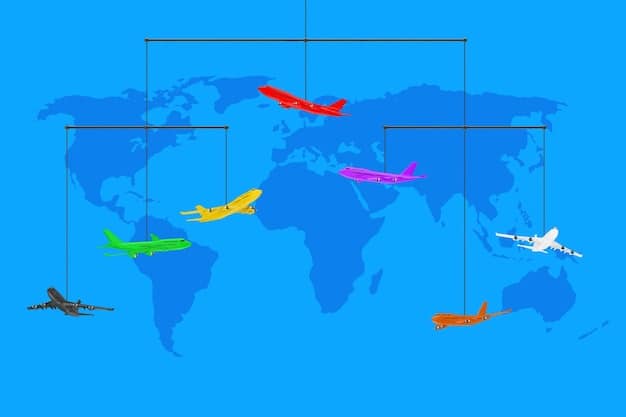Airline Miles Award Charts 2025: Find Sweet Spots & Changes

Airline miles award charts are evolving, with many airlines switching to dynamic pricing, making it crucial to understand these changes to maximize your miles’ value and find sweet spots for affordable travel in 2025.
Navigating the world of airline miles can be daunting, especially with frequent changes to award charts. Understanding these charts and finding the hidden sweet spots is key to maximizing the value of your miles and securing affordable travel. Let’s explore the ins and outs of airline miles award charts and how to make the most of them in 2025.
Understanding Airline Miles Award Charts
Airline miles award charts are tables that show the number of miles required to redeem a flight between specific destinations. These charts traditionally offered fixed prices, making it easier to plan and budget for award travel. However, many airlines are moving towards dynamic pricing, which ties the cost of an award ticket to the cash price.
The Basics of Award Charts
Award charts are usually categorized by regions or zones, and the number of miles needed depends on the class of service (economy, business, first class). Understanding how these charts are structured is the first step in finding the best deals.
Fixed vs Dynamic Award Charts
Fixed award charts offer predictable redemption rates, while dynamic charts fluctuate based on demand and availability. Knowing which airlines use which type of chart can significantly impact your travel strategy.

Here are some key differences between fixed and dynamic award charts:
- Predictability: Fixed charts offer predictable pricing, while dynamic charts can vary greatly.
- Value: Dynamic charts can sometimes offer lower prices during off-peak times, but can also be much higher during peak seasons.
- Planning: Fixed charts allow for easier planning, as you know exactly how many miles you need. Dynamic charts require more flexibility.
In conclusion, understanding the basics of airline miles award charts, whether fixed or dynamic, is crucial for making informed decisions about your travel plans.
Changes in Airline Award Charts for 2025
The airline industry is constantly evolving, and so are airline miles programs. In 2025, it’s crucial to stay informed about the changes to award charts, as these can significantly impact the value of your miles. Many airlines are adjusting their pricing models, redemption rates, and partner airline agreements.
Major Airline Updates
Several major airlines have announced changes to their award charts for 2025. These updates include adjustments to mileage requirements, the introduction of peak and off-peak pricing, and changes to the availability of award seats.
Impact on Redemption Rates
The changes in award charts directly impact the redemption rates for flights. Some routes may become more expensive, while others may offer better value. Analyzing these changes is essential to maximizing your miles.
Here are a few notable changes to watch for:
- Delta SkyMiles: Continued shift towards dynamic pricing, making it harder to predict redemption rates.
- United MileagePlus: Adjustments to partner airline redemption rates, potentially increasing the cost of international flights.
- American Airlines AAdvantage: Introduction of peak and off-peak pricing on some routes, offering potential savings during off-peak travel.
Finding Sweet Spots in Award Charts
Despite the changes in airline miles programs, there are still sweet spots to be found in award charts. These are specific routes or redemption opportunities that offer exceptional value for your miles. Identifying these sweet spots can help you maximize your travel rewards.
Hidden Gems and Routes
Some routes offer significantly better value than others. These hidden gems are often less popular routes or those with lower demand, allowing you to redeem your miles for less.
Maximizing Partner Airline Redemptions
Partner airline redemptions can be a great way to find sweet spots. By understanding the award charts of partner airlines, you can often find better deals than redeeming directly with the major carrier.

Tips for finding sweet spots:
- Research extensively: Use tools and websites to compare redemption rates for different routes and airlines.
- Be flexible: Being flexible with your travel dates and destinations can help you find better deals.
- Consider partner airlines: Explore redemption options with partner airlines, as they often have better availability and rates.
In conclusion, finding sweet spots in award charts requires research, flexibility, and a strategic approach to maximizing partner airline redemptions.
Strategies for Using Airline Miles in 2025
With the evolving landscape of airline miles programs, having effective strategies for using your miles is more important than ever. These strategies include earning miles efficiently, redeeming them wisely, and staying informed about program changes.
Earning Miles Efficiently
Earning miles efficiently involves maximizing your everyday spending and taking advantage of bonus opportunities. Credit card rewards, airline partnerships, and spending bonuses can all help you accumulate miles quickly.
Redeeming Miles Wisely
Redeeming miles wisely means understanding the value of your miles and choosing redemptions that offer the best return. This includes considering the class of service, destination, and time of year.
Key strategies for using airline miles:
- Maximize credit card rewards: Use credit cards that offer bonus miles on travel, dining, and other common expenses.
- Take advantage of promotions: Keep an eye out for limited-time promotions that offer bonus miles on flights, hotel stays, and other activities.
- Be flexible with your travel dates: Traveling during off-peak times can help you find better redemption rates and availability.
Common Mistakes to Avoid
Navigating airline miles programs can be complex, and it’s easy to make mistakes that cost you valuable miles. Avoiding these common pitfalls can help you maximize the value of your rewards and travel more affordably. One frequent error is failing to understand the nuances of airline miles award charts.
Not Understanding the Rules
Airline miles programs have specific rules and restrictions that can impact your ability to redeem miles. Not understanding these rules can lead to frustration and wasted miles.
Letting Miles Expire
Many airline miles programs have expiration policies, and letting your miles expire is a common mistake. Keeping track of your miles and engaging in earning or redemption activity can help you avoid losing them.
Common mistakes to avoid:
- Ignoring expiration policies: Set reminders to keep track of your miles and ensure they don’t expire.
- Not reading the fine print: Understand the rules and restrictions of the airline miles program to avoid unexpected fees or limitations.
- Overlooking partner airline options: Explore redemption opportunities with partner airlines to find better deals and availability.
Future Trends in Airline Miles Programs
Looking ahead, the airline miles landscape is likely to continue evolving, with new trends and technologies shaping the future of travel rewards. Staying informed about these trends can help you adapt your strategies and continue to maximize the value of your miles. Understanding these trends is particularly important when dealing with airline miles award charts.
Personalized Offers and Experiences
Airlines are increasingly using data and technology to personalize offers and experiences for their members. This includes tailored redemption options, targeted promotions, and customized travel recommendations.
Integration with Other Loyalty Programs
The integration of airline miles programs with other loyalty programs, such as hotel rewards and credit card points, is becoming more common. This allows you to combine different types of points and miles to achieve your travel goals more easily.
Future trends to watch for:
- Enhanced personalization: Expect to see more personalized offers and experiences based on your travel preferences and spending habits.
- Greater flexibility: Airlines may offer more flexible redemption options, such as the ability to use miles for upgrades, lounge access, and other travel-related expenses.
- Blockchain technology: Blockchain could potentially revolutionize airline miles programs by providing greater transparency, security, and flexibility.
| Key Point | Brief Description |
|---|---|
| ✈️ Award Chart Types | Fixed vs. Dynamic: Understand the pricing model. |
| 🧭 Finding Sweet Spots | Less popular routes and partner redemptions. |
| 💳 Earning Strategies | Maximize credit card rewards and promotions. |
| 📅 Avoiding Mistakes | Track miles and understand program rules. |
Frequently Asked Questions
▼
An airline miles award chart is a table that shows how many miles you need to redeem a flight between two destinations. Some airlines use fixed charts, while others use dynamic pricing.
▼
Look for less popular routes, consider partner airline redemptions, and be flexible with your travel dates. Researching and comparing redemption rates can also help.
▼
Avoid letting your miles expire, not understanding program rules, and overlooking partner airline options. Always read the fine print and keep track of your miles.
▼
Maximize credit card rewards, take advantage of promotions, and participate in airline partnerships. Everyday spending on rewards credit cards can add up quickly.
▼
Expect to see more personalized offers, greater integration with other loyalty programs, and potential use of blockchain technology for increased transparency and flexibility.
Conclusion
Understanding and adapting to the changes in airline miles award charts is essential for maximizing the value of your miles in 2025. By staying informed, employing strategic earning and redemption methods, and avoiding common mistakes, you can continue to enjoy affordable and rewarding travel experiences.





